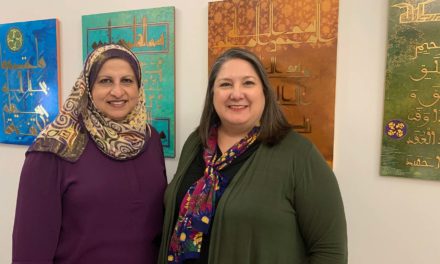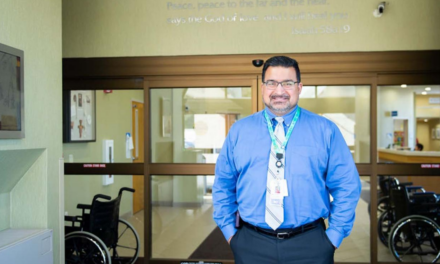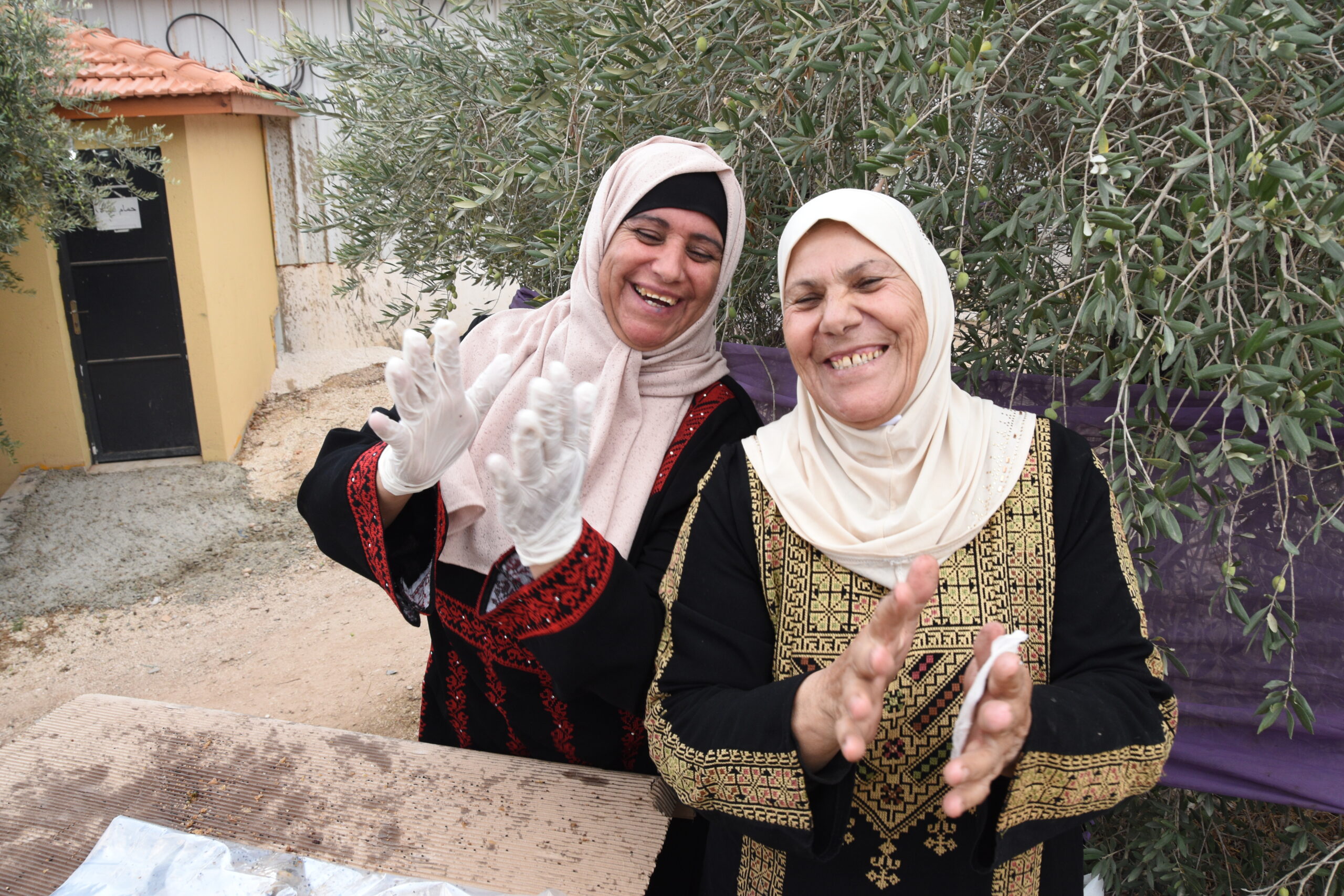
Photos courtesy of Canaan Palestine
Women farmers who work with Canaan Palestine as part of the women cooperatives organized under the Palestine Fair Trade Association (PFTA)
Palestinian company Canaan Palestine preserves the centuries-old culinary and agricultural traditions of the Holy Land and its native olive trees by way of authentic olive oil, seasonings and ingredients. Headquartered in Jenin, the company directly sources olives from over a thousand farmers from all over Palestine through fair trade practices, working closely with the Palestine Fair Trade Association. Canaan Palestine has a U.S. office in Madison, Wisconsin, and their products may be found in grocery stores all over the U.S. and Canada.
The Canaan Palestine website states, “Our story is of farmers who work the land from dawn to dusk to feed their families and produce amazing food for the world to savor.”
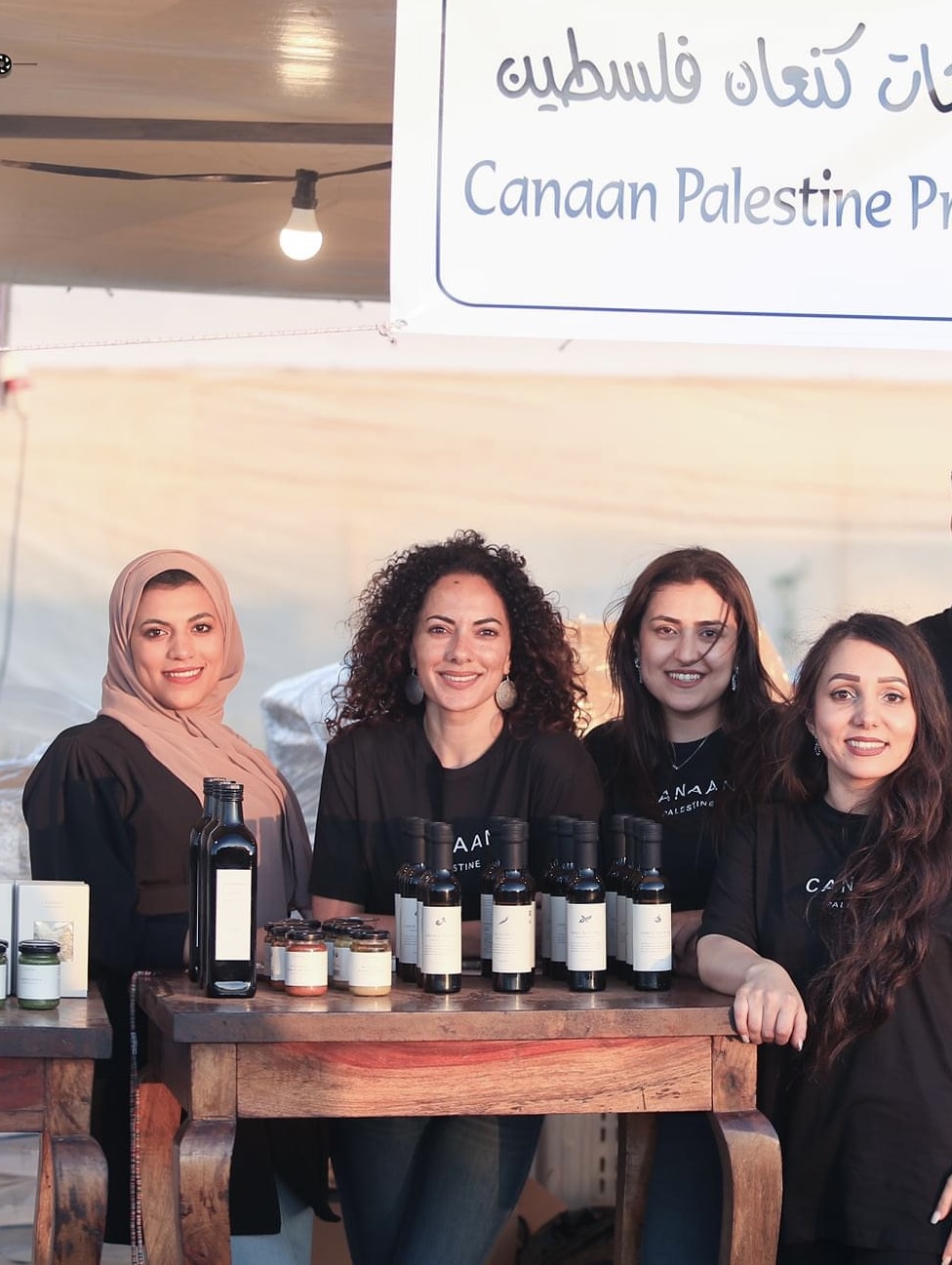
Fatin Zahra, (center) business manager of Canaan Palestine, at a Canaan Palestine organized event—the annual wheat festival in the village of Al-Jalameh, north of Jenin.
Palestinian olive oil is ‘liquid gold’, the product of lands where some of the first known agricultural practices in history ever started. Much of Canaan Palestine’s olive oil comes from preserved ancient trees, some of which are over 3,000 years old.
Fatin Zahra, Business Manager of Canaan Palestine, grew up split between Ramallah, Palestine and the US, spending time living in both Kenosha, Wisconsin and Chicago. Currently based in Ramallah, she handles the company’s US market.
“I have olive trees in my family, like the majority of Palestinian families,” Zahra shares. “It’s something that we’re very connected to and take pride in.”
Dr. Nasser Abufarha, founder of Canaan Palestine, earned his Master’s Degree in Cultural Anthropology and Urban and Regional Planning from the University of Wisconsin-Madison in 2006.
The son of a farmer, Abufarha spent most of his youth growing up in Palestine and has seen his people and family struggle within the olive industry, as Zahra explains. “Back in the day, there were no regulations on the price of olive oil. People were being underpaid and ripped off from so many different aspects, so a lot of the farmers were struggling to maintain a life under this work.”
To revolutionize the entire landscape of the Palestinian olive industry with a business model that empowered farmers, Abufarha established the Palestine Fair Trade Association in 2004, which organized thousands of small-scale farmers in the West Bank into village-based cooperatives under fair trade, organic standards and linked them to markets worldwide.
He subsequently founded Canaan Palestine in Madison as a sister company and distributor for the farmers’ products. Having a US-based company makes it much easier for the farmers to export their goods, plus Canaan pays them premium, up-front prices.
“It would be very difficult, considering that we live under occupation, to have single orders picked, packed and filled right out of Palestine,” Zahra continues. “It would be too much money for the customer and wouldn’t be efficient for the company.”

Dr. Nasser Abufarha, founder of Canaan Palestine and son of a Palestinian farmer, organized thousands of small-scale farmers in the West Bank into village-based cooperatives under fair trade, organic standards and linked them to markets worldwide.
Canaan Palestine now partners with over 4,000 Palestinian family farms across approximately 52 villages, according to their website, and they export to about 13 countries. They account for about 90 percent of the olive oil used by company Dr. Bronner’s Magic Soap, who helped fund Canaan’s organic and fair trade certifications.
Farmers have the choice of using either the olive press in their village or the press at Canaan headquarters in Jenin. “I’ve visited these villages, and the trees are majestic and beautiful,” Zahra attests. “If you take care of these trees and the land, and you use practices that are regenerative, they will continue to feed people for millennia.”
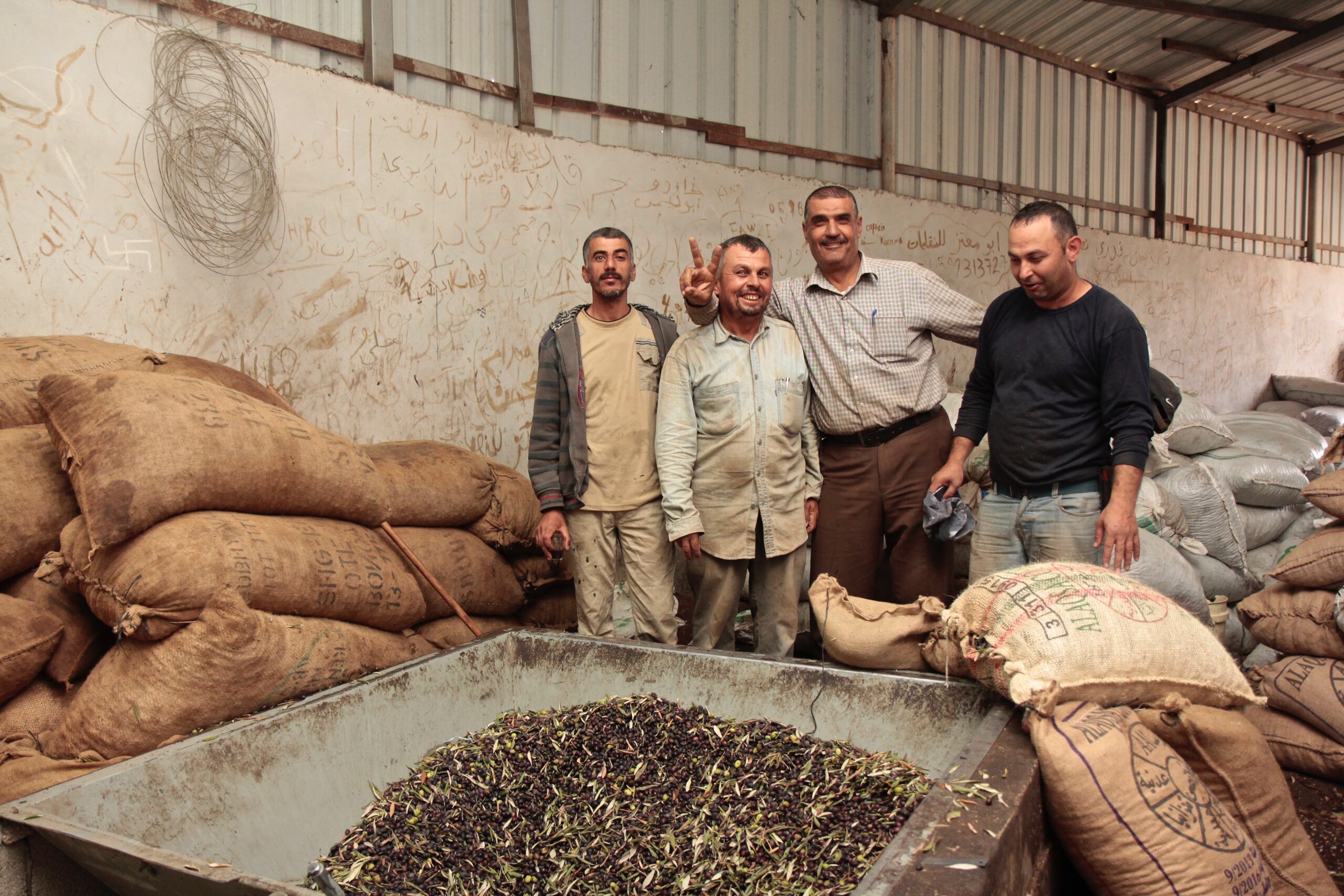
Palestinian farmers at an olive press in Jenin, Palestine.
The three primary varieties of Canaan Palestine olive oil are the signature cold-pressed Jenin, the tangy and peppery Rumi, and the sweet and smooth Nabali. “The Jenin oil profile I would say goes with everything, whether it be dipping or cooking,” Zahra notes. “The Rumi is great for dipping and drizzling on salads or hummus, and the Nabali is buttery and fruitier.”
There are several fused oils available including basil, lemon, chili and garlic varieties, made by crushing the respective ingredient and olives together during the press process.
Canaan Palestine also sells several condiments such as shatta hot sauce, sweet olive spread, almond pesto, and two types of tapenades. Additional products include the artisanal spice mix za’atar, Palestinian couscous maftoul, and green cracked wheat freekeh.
“Za’atar is a staple in Palestinian households,” Zahra assures. “You will never be out of za’atar; we eat it every day throughout the day. People can use it in marinades or add it to bread. You can make a freekeh soup, or use it in a salad with a modern twist.”
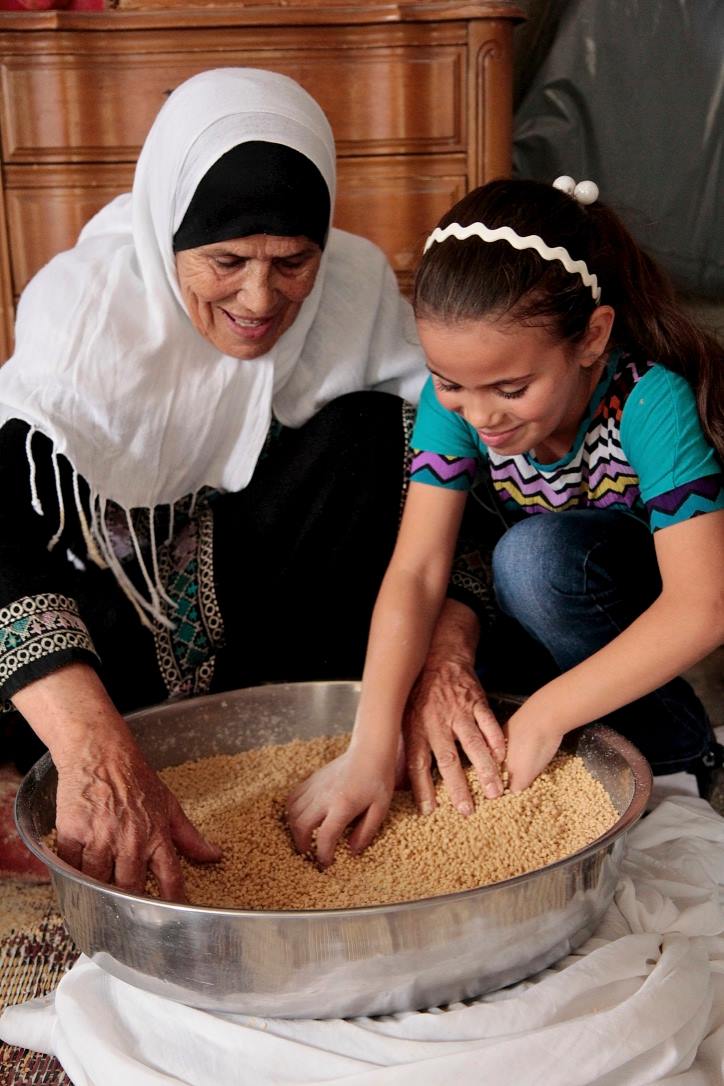
Farmer making maftoul in Deir Ballout south of Nablus.
Under the “Discover” tab on the Canaan Palestine website, different recipes containing their oils and ingredients are available along with articles about the Palestinian olive harvest. The website also features an interactive map of every grocery store, boutique, cafe and retailer in the US and Canada that carries Canaan products.
It is November, therefore the middle of olive harvest season in Palestine. However, this olive harvest will not be the same as other harvests, as the ongoing genocide in Palestine has taken a significant toll on the region’s agriculture, industry and morale.
“Everyone welcomes this time, it’s the most exciting time,” Zahra says. “But the ongoing genocide in Gaza has brought immense devastation and suffering to Palestine.”
Palestinians in the West Bank face restriction of movement, limited access to their olive trees and violent attacks from Zionist settlers. “Last year during our harvest season, maybe a third of the farmers’ olive groves were unharvested,” Zahra estimates. “This loss deeply impacted the livelihoods of countless families who rely on the harvest for their income.”
Farmers often have to be granted a permit by the Israeli army to be able to visit the lands that have been in their families for generations. Roads between villages often get blocked, and olive groves have been stolen or burned. Tragically, some farmers were even shot and killed while harvesting their trees.
Zahra affirms, “It has been devastating, but we are Palestinians, and we are steadfast and we insist on life. We will do whatever it takes to keep living. We’re grateful to welcome the olive harvest season, yet it’s difficult to feel any true happiness amidst everything happening right now.”
In any event, Canaan Palestine will always buy olive oil from the farmers and help them stay rooted in their lands. Zahra maintains, “We just hope that people stay safe, Inshallah, we’re protected by God.”
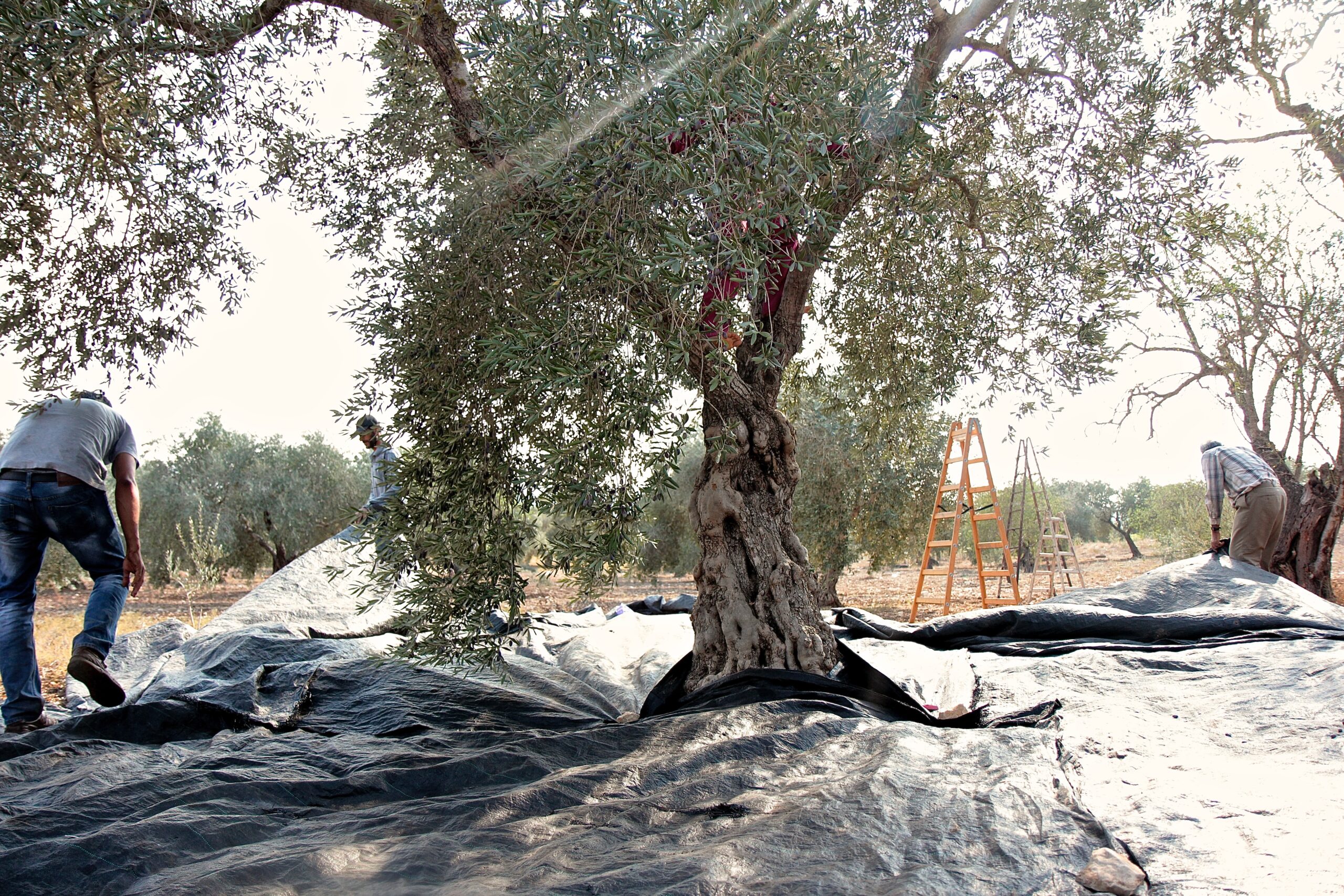
Olive harvest season, which is typically in October and November, in Jenin, Palestine.
As of this October, Canaan Palestine olive oil is Regenerative Organic Certified, which is a significant accomplishment in accordance with the company’s values of ecological sustainability, food security and cultural integrity.
Canaan also celebrates their 20th anniversary as a company this year. “It’s a really incredible milestone to have been able to impact the Palestinian economy and farmers for the last 20 years,” Fatin Zahra concludes. “We’ll be publishing news about that in the coming weeks.”
Click on image to watch video, Canaan Living Culture


